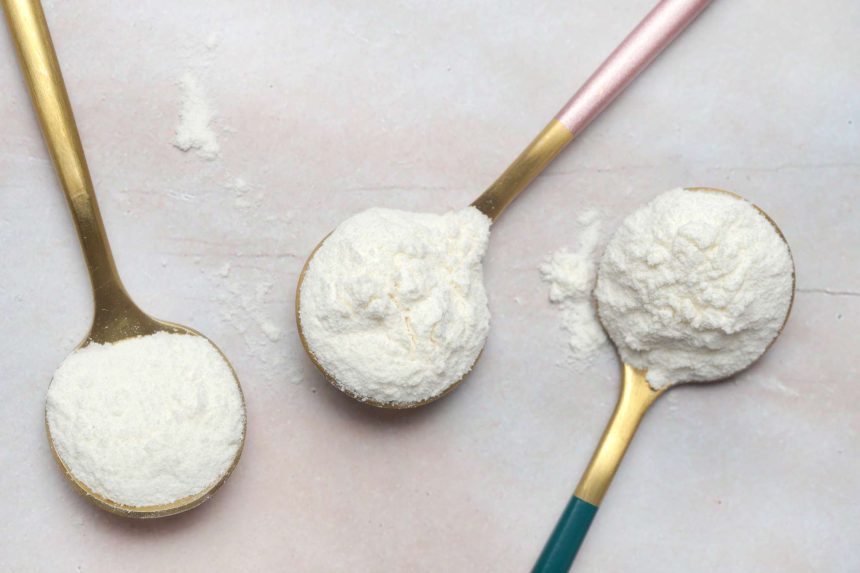| Collagen powder | Whey protein powder | |
| Calories | 70 | 77 |
| Protein | 18 grams (g) | 13 g |
| Carbohydrates | 0 g | 3.6 g |
| Fat | 0 g | 1 g |
| Complete protein | No | Yes |
| Branched-chain amino acids (BCAAs) | Low | High |
Collagen and whey protein powder are high in protein and have similar calories. However, their amino acid profiles set them apart. Amino acids are the building blocks of protein.
Whey Protein
Whey protein is a complete protein that has all nine essential amino acids, including the branched-chain amino acids (BCAAs): leucine, isoleucine, and valine. Essential amino acids are those your body doesn’t make on its own. Therefore, they must come from the foods you eat.
BCAAs are mainly broken down in your muscles rather than your liver. Some evidence suggests that BCAAS may help stimulate muscle growth and increase energy production.
Whey protein also contains small amounts of fat and carbohydrates.
Collagen Protein
Collagen protein is considered incomplete because it lacks the essential amino acid tryptophan and is low in BCAAs and lysine.
That said, collagen has unique amino acids and is very high in hydroxyproline, glycine, and proline. Hydroxyproline is a nonessential amino acid not easily found in other proteins.
Whether you should choose collagen or whey protein depends on your health goals.
Whey Protein
Whey protein supplements typically contain either whey protein concentrate, isolate, or a combination of the two. Whey protein concentrate undergoes more processing and has a higher protein content.
Whey protein concentrate also contains slightly less lactose than whey protein isolate, which may make it a better choice for people with lactose sensitivity. However, it also tends to be more expensive.
Collagen
There are many different types of collagen, but types I-V are the most common in supplements.
Types I and III are best for skin health, while type II may be better for joint health. Choosing a supplement with multiple collagen types can provide a greater range of health benefits.
Most collagen supplements are made with hydrolyzed collagen or collagen peptides. That means the collagen has been broken down into smaller chains that are easier for your body to digest and use. Most collagen supplements are made from cow or chicken, though marine collagen from fish is also available.
The United States Food and Drug Administration (FDA) doesn’t regulate collagen or whey protein powders. For this reason, it’s a good idea to look for supplements that have been third-party tested for purity and safety.
Collagen is a protein that supports your skin, bones, cartilage, and connective tissue. Your body naturally produces collagen, but its production declines with age, leading to signs of aging such as wrinkles and joint pain.
Skin and Hair Health
Collagen peptides are broken down into amino acids when you digest them. After being absorbed in your gut, they are transported to your skin to support new collagen and elastin fiber production. Elastin is a protein that makes the skin more elastic.
A recent review found that taking 1–10 grams of collagen daily can reduce wrinkles and improve skin health by improving elasticity, firmness, brightness, and hydration.
Collagen may also help with hair growth. Studies show that supplements with collagen, vitamins, and minerals can improve hair thickness in people with hair loss. However, research on collagen for hair is limited.
Bone and Joint Health
Collagen supplements may increase bone strength and density while reducing joint stiffness. Because collagen is high in glycine, an anti-inflammatory compound, it may also help relieve joint pain by reducing inflammation.
One study review found that people who consumed 5–15 grams of collagen daily experienced less joint pain than those who didn’t take collagen.
Muscle Growth and Recovery
Growing evidence suggests that taking collagen supplements, paired with resistance training, can improve muscle growth and recovery.
In one review, researchers found that collagen improved muscle recovery and reduced joint pain when consumed at least an hour before resistance training over three months.
Other studies have shown that collagen can quicken healing and improve joint pain in people with Achilles tendinopathy (pain in the Achilles tendon) and joint pain caused by exercise.
Although collagen has not been as well researched as whey protein for muscle growth, data suggests it may help produce more creatine and other proteins needed for muscle building. In a study of older men with muscle loss, participants who exercised and consumed 15 grams of collagen daily saw improved strength and muscle mass.
While more research is needed, collagen supplements are lower in muscle-building amino acids, so they’re likely not as effective for muscle growth.
Whey is a high-quality protein made from whey, the liquid part of milk that separates from the curds when making cheese. It’s commonly used to boost daily protein intake, promote muscle growth, and improve exercise performance.
Complete Protein
Whey is a complete protein containing all 20 amino acids, including the nine essential amino acids your body can’t produce. The amino acids in whey are absorbed quickly, making it a good option for growing and repairing muscle shortly after a workout.
Muscle Growth and Repair
Whey protein powders are popular among fitness enthusiasts who want to gain lean muscle mass. They are rich in amino acids, especially the BCAA leucine. Research shows that leucine can help your body build and repair muscle.
One small study found that people who consumed hydrolyzed whey protein immediately before and after exercise saw more muscle and strength gains than those who didn’t.
When combined with exercise, whey protein may be particularly helpful for building and maintaining muscle mass in older adults. Studies also suggest that consuming whey protein can promote muscle recovery and speed up muscle repair after intense exercise.
Weight Management
Whey protein may help increase the feeling of fullness, which can help you manage your weight. Research shows that whey can increase hormones that make you feel full, like cholecystokinin (CCK) and glucagon-like peptide 1 (GLP-1).
One research review found that people who took whey protein supplements lost more body weight and fat mass than participants who didn’t.
Collagen is generally considered safe when consumed in doses of 2.5–15 grams per day.
Side Effects of Collagen
Side effects are rare but may include:
- Diarrhea
- A bad taste in the mouth
- Headache
- Dizziness
- Indigestion
- Rash
Most collagen supplements contain animal products, so you’ll want to avoid them if you follow a plant-based diet. Collagen may also contain fish, shellfish, or eggs, which could pose a safety risk for people with allergies to these ingredients.
Side Effects of Whey Protein
Whey protein supplements are also considered safe for most people. High doses are more likely to cause side effects, including:
- Diarrhea
- Acne
- Thirst
- Bloating
- Decreased appetite
- Fatigue
- Headache
Whey protein isn’t the best for you if you’re allergic to cow’s milk, follow a vegan diet, or are lactose intolerant.
Before adding collagen or whey protein supplements to your diet, talk to your healthcare provider, especially if you have existing health issues.
The main difference between collagen and whey protein is their amino acid profile and health benefits.
Collagen’s amino acids make it better for skin and joint health, while whey protein is a complete protein that can support muscle growth and help you feel full.
The choice between collagen and whey protein ultimately comes down to your health and fitness goals.







